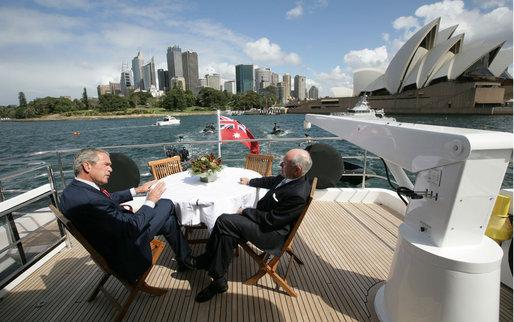
For political tragics, there’s not much than can surprise about John Howard. His consistency reaches towards the rigid. But here’s a statement to puzzle tragics: J.W. Howard—when in power—was a good, pragmatic multilateralist.
During nearly a dozen years as Australia’s second longest serving prime minister, he often embraced multilateral institutions and instruments.
The language was always about the national interest, yet that fed a quiet and effective commitment to broad international approaches and solutions.
But you’d never know it with the way Howard burnishes his legend now.
The scorn he expresses towards multilateralism and international institutions is one of the inconsistencies between today’s Liberal elder and the realities of what the working PM did. More than inconsistent, that scorn has damaged the modern Liberal Party (and Australian interests).
To the two great strands of Oz political opinion on the United Nations—Evatt Enthusiasm and Menzies Scepticism—Howard has introduced a third, UN Rejectionism. Rejectionism was bluntly expressed when Howard killed off a run for Australia’s election to the UN Security Council as a waste of time and money.
His memoir offers only one sentence in praise of the UN as an organisation that doesn’t carry an immediate qualifier.
In retirement, Howard’s mental tic about the UN has grown into a sore spot in the Liberal Party’s psyche. Howard’s UN Rejectionism is expressed by his ideological heirs in an Animal Farm chant: ‘Alliance great, bilateral good, multilateral bad.’
In power, leaders are creatures of compromise and consequences. In retirement, they brandish their tics and prejudices without having to worry about the policy penalties. The stories that leaders tell of the past, though, influence future followers.
One of Howard’s heroes, former British prime minister Margaret Thatcher, demonstrates the problem. In retirement, Thatcher was far more hardline and vehement in attacking the European Union than she was when in office. That’s worked out well for the Tories and Britain, no?
In the US, the modern Republican version of what President Ronald Reagan stood for has less and less connection with the pragmatism that the Gipper mixed with his principles.
It used to be the left of politics that was guilty of believing the legends rather than knowing the history. The right has developed the same tendency.
My musings on Howard then and now were revved along by his masterful performance at the preview of the 1996 and 1997 cabinet papers, now released by the National Archives of Australia. While he’ll turn 80 in July, Howard remains a formidable political warrior, still with an instant and detailed command of the facts and the arguments. Like Winston Churchill, Howard expects history to be kind to him, because he’ll write that history.
One of the points Howard made at the archives event was that he always preferred the bilateral to the multilateral in international affairs. He saw that as one of his many differences with Labor’s Paul Keating, whom he replaced as PM at the 1996 election. ‘Keating was more of a multilateralist than I was. I believe in multilateral institutions when they work.’
That’s the well-worn Howard line: he presents as the pragmatic realist who prefers to work a bilateral deal rather than grapple with multilateral machinations. His equation, though, ignores the great difference between two countries doing a deal and many countries achieving a workable compromise. Multilateralism is harder because the payoffs are bigger.
Today’s Liberal-led government chanting for the (liberal) rules-based international order needs to know that beneath the grey, realist coat of Howard’s government were the rainbow hues of multilateral achievement.
As a big for instance, see the greatest international win of Howard’s leadership—Australia leading the UN intervention to save East Timor from the turmoil of its independence vote.
Another fascinating example in the archives is the argument the Howard government had with itself over landmines.
It’s not often in Canberra that Foreign Affairs beats Defence in a debate about a weapon. Especially when banning mines went against the interests of the great and powerful ally, the US.
Yet all this happened under Howard, who was always the uber defence minister. On taking office, he declared that every element of government faced cuts—except defence. As Howard recalled at the archives event, he’d instructed, ‘You can’t touch defence.’
In August 1997, Defence Minister Ian McLachlan told cabinet that Australia shouldn’t take part in the negotiations to ban anti-personnel landmines (APL) because it’d ‘produce a flawed treaty, the signature of which would damage our defence capability, without a compensating humanitarian gain’.
Foreign Minister Alexander Downer won that initial round and Australia went to the negotiating table.
By November 1997, they were back in cabinet for the final round: should Australia sign the Ottawa treaty?
Foreign Affairs argued:
[T]here are strong humanitarian reasons to sign. There is also a community expectation that the Government’s strong support for an effective global ban on landmines will translate into signature. Foreign Affairs also notes that under current Australian policy, operational use of APL by the ADF [Australian Defence Force] is indefinitely suspended, the suspension being subject to review only in case of a substantial deterioration of Australia’s strategic circumstances, in which Australia’s security was under threat and the denial of an APL capability to the ADF would result in additional Australian casualties and damage to vital infrastructure.
Defence advised that ‘signature will deny the ADF a capability which it judges potentially useful and present challenges to the ADF in its responsibility for the military security of Australia and potential difficulties in cooperation with allies’.
So Defence didn’t want it. The US didn’t want it. Yet Australia signed.
John Howard—that pragmatic multilateralist—glimpsed the rainbow and came through for the rules-based international order.